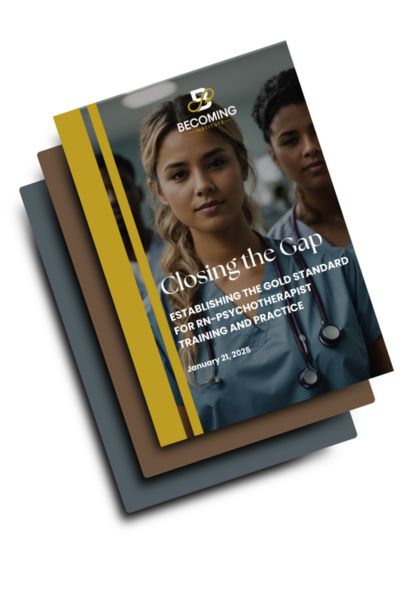Choose Your Path

3-Day Becoming Method® Intensive Training

RN-Psychotherapist Program
🕒 6–8 Months
On-line + Live 3-Day Intensive
For Registered Nurses including NPs, CNSs & PSWs
Apply Now


🕒 6–8 Months
On-line + Live 3-Day Intensive
For Registered Nurses including NPs, CNSs & PSWs
Apply Now
Establishing the Gold Standard for RN-Psychotherapy Practice In Ontario.
A Position Paper
As Canada confronts an unprecedented surge in mental health demands, exacerbated significantly by the COVID-19 pandemic, the role of RN-Psychotherapists in the healthcare system has become increasingly vital. Registered Nurses (RNs) with expertise in psychotherapy are well-positioned to address the escalating mental health crisis, particularly in underserved communities where access to mental health services remains limited. However, despite the growing need for qualified mental health professionals, the College of Nurses of Ontario (CNO) has yet to establish comprehensive and specific standards of practice for RN-Psychotherapists, resulting in two significant consequences.
First, RNs who wish to practice psychotherapy must often leave the nursing profession to obtain the necessary skills, as undergraduate nursing education does not adequately prepare them for this specialized role. Second, the absence of clear regulatory standards has created systemic barriers, leaving key stakeholders—including healthcare institutions, professional organizations, and insurance companies—questioning the competence and legitimacy of RN-Psychotherapists. This lack of recognition undermines their ability to practice effectively within the healthcare system and limits public access to much-needed mental health services.
To ensure the safe and effective integration of RN-Psychotherapists into the healthcare system, CNO must build upon its existing framework and establish advanced practice standards similar to those developed for Nurse Practitioners (NPs). The regulation of RN-Psychotherapists must explicitly define the advanced competencies, insights, and experiential learning required to provide psychotherapy at a high standard. CNO has taken initial steps toward defining the role, but further action is required to protect both the public and the integrity of the nursing profession.
RN Competency in Psychotherapy
The assertion that RNs are duly qualified to practice psychotherapy is well-founded. Nursing education equips RNs with essential foundational competencies in therapeutic communication, patient assessment, and evidence-based intervention strategies—skills that align with core psychotherapeutic principles. Furthermore, nurses operate under a framework of holistic care that inherently integrates psychological, emotional, and social well-being into their practice. The Canadian Nurses Association (CNA) acknowledges that RNs play a critical role in mental health care and that their scope includes therapeutic interventions that address psychological distress (CNA, 2022).
However, while RNs may be trained in therapeutic techniques, undergraduate nursing programs do not provide in-depth instruction on psychotherapy theory, methodology, or clinical application. As a result, RNs seeking to develop expertise in psychotherapy must pursue additional education outside the nursing profession, often through programs designed for social workers or registered psychotherapists. This disconnect forces many nurses to leave the profession temporarily or permanently to obtain the credentials necessary to be recognized as competent psychotherapists.
Lack of Standards Creates Barriers
The absence of a clearly defined regulatory standard for RN-Psychotherapists has left them in a precarious position, particularly when interacting with insurance providers, employers, and governing bodies. Without formalized competencies, insurance companies frequently deny reimbursement for psychotherapy services provided by RNs, limiting patient access to care and undermining the professional legitimacy of RN-Psychotherapists. This issue is exacerbated by inconsistencies in recognition across institutions, where some healthcare settings acknowledge the expertise of RN-Psychotherapists while others do not.
CNO’s current approach—requiring RNs to self-direct their competency development through its Quality Assurance (QA) program—is insufficient. Unlike Nurse Practitioners, who follow a standardized, structured pathway to advanced practice, RN-Psychotherapists are left without a clear educational or professional trajectory, resulting in varied skill levels and gaps in competency development.

Submitted to:
College of Nurses of Ontario
Registered Nurses of Ontario
Nurse Psychotherapy Association of Ontario
Canadian Nurses Association
Ministry of Health of Ontario
Our Path to Success!
Becoming Institute
We urge College of Nurses of Ontario (CNO), Registered Nurses Association of Ontario (RNAO), Nurse Psychotherapy Association of Ontario (NPAO), Canadian Nurses Association (CNA), and the Ministry of Health of Ontario (MOH) to collaborate in developing a sustainable and equitable framework for RN-Psychotherapists.
As a regulatory body, CNO has initiated important foundational work in this area, but it is time to go further. CNO has an obligation to establish a structured framework for RN-Psychotherapists, that recognizes it as an advanced practice similar to the Nurse Practitioner. The future of mental health care depends on recognizing and supporting RN-Psychotherapists as vital contributors to Ontario’s healthcare system.
The growing demand for mental health services in Ontario requires immediate action to optimize the role of RN-Psychotherapists. While RNs are fundamentally well-equipped to provide psychotherapy, the absence of specific practice standards has resulted in systemic barriers that prevent their full recognition and integration into the healthcare system.

CNO must establish a clear, evidence-based standard of practice for RN-Psychotherapists, similar to the framework developed for Nurse Practitioners. This should include:

For RN-Psychotherapists to be fully integrated into Ontario’s healthcare system, CNO must work with policymakers and healthcare institutions to:

CNO has an ethical and regulatory responsibility to protect both the public and the nursing profession. By failing to establish clear practice standards, CNO risks allowing inconsistencies in psychotherapy training that could negatively impact patient care. A standardized approach would:
Thank you for downloading Closing The Gap. We value any insight you can offer to refine our recommendations and make our proposal even stronger! If you have suggestions for change or additional recommendations, please share your insights with us.
Want to be more involved? Join our Raising The Standard working group to help elevate RN-Psychotherapist practices across Canada. Email us at info@lemonchiffon-frog-117233.hostingersite.com with the subject line “Raising the Standard for RN-Psychotherapist. Together, let’s set a new standard in healthcare.
~Becoming Institute
Every contribution makes a difference! Your support helps provide scholarships, resources, and opportunities for students to succeed. Together, we can transform lives and create a future of healing and empowerment.
Dr. Joan Samuels-Dennis,
Dean, School of Psychotherapeutic Innovations
Becoming Institute Inc